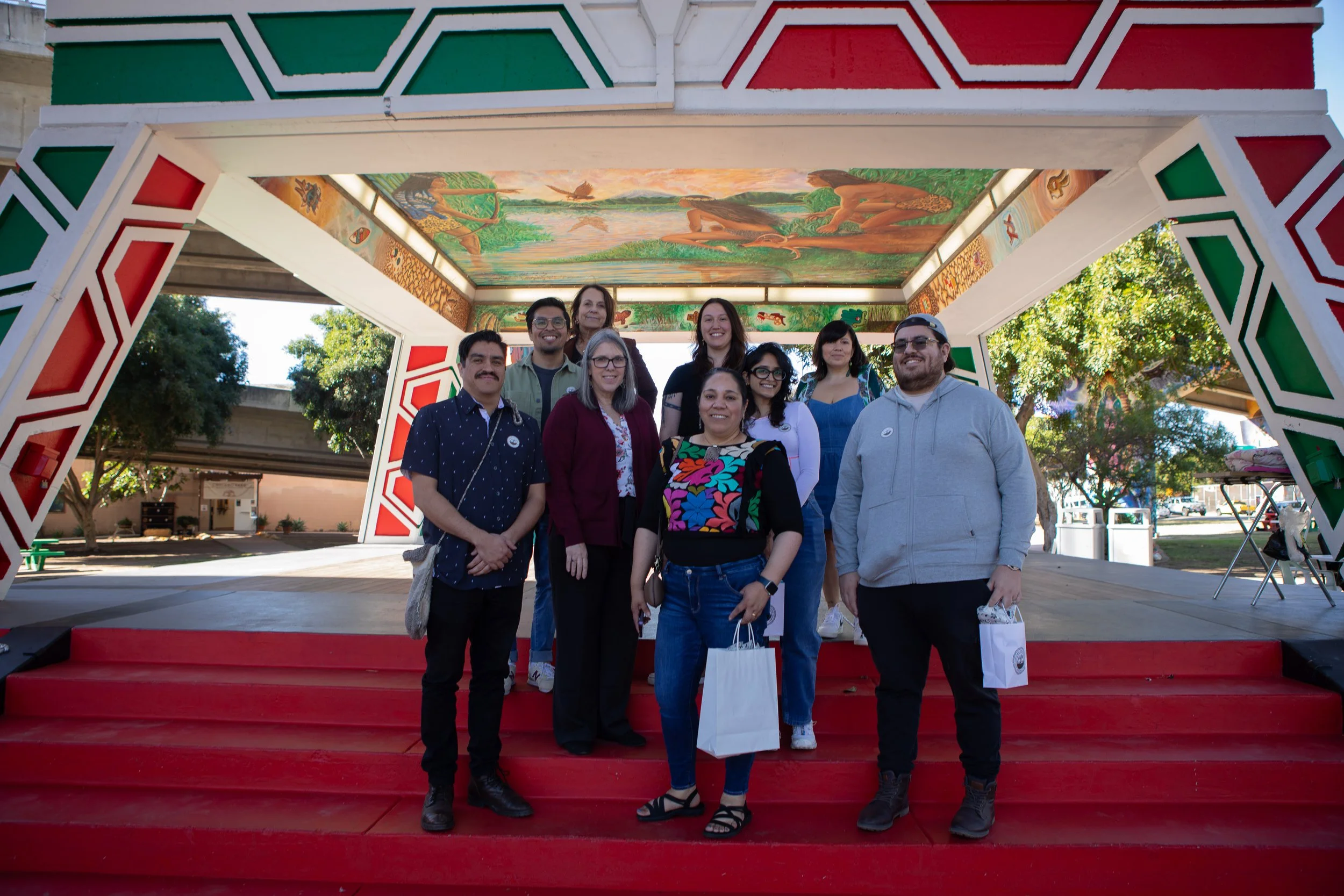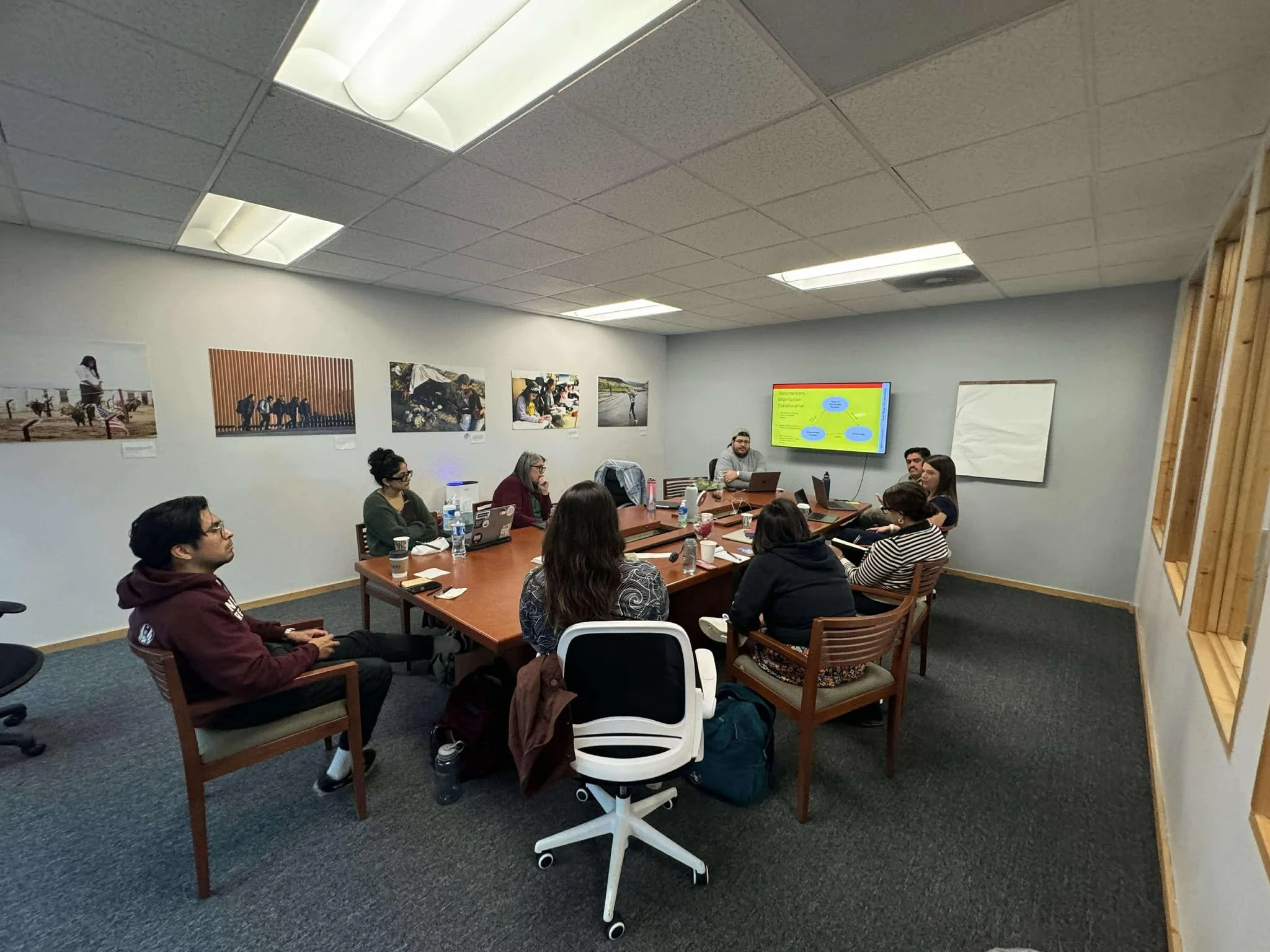Strengthening our collective impact through deepening relationships across different sites and contexts
By Navjot Heer
San Diego (host), Wichita and Los Angeles Documenters visit Chicano Park in San Diego. (Photo: Iran Martinez)
This piece is part of our Documenters Showcase—a content series spotlighting the stories, impact, and growing network of people and organizations around the U.S. shaping participatory media and turning civic information into community power as part of City Bureau’s Documenters Network. Check out our most recent Showcase story, “AI Is Increasingly Shaping Local Journalism. How Do We Keep People at the Center?”
As the Documenters Network continues to expand and sites explore new ways to meet the needs of their communities, City Bureau is creating intentional touchpoints to strengthen the collective work of building civic media nationwide. As part of our broader strategy to reinforce cross-site learning, City Bureau piloted a Peer Exchange Program by subgranting $40,000 to Documenters sites, funding travel and planning logistics for in-person site visits. Through this investment, Documenters program staff visited other sites to learn about their local program’s context. This pilot program is one example of how City Bureau is supporting critical network infrastructure beyond the foundational tools, content, and technology of the Documenters program model. When we create opportunities to deepen relationships across different sites and contexts, test new ideas and share the results with the network, and evolve in alignment with community needs, we strengthen our collective impact.
As City Bureau’s Documenters Network prepares for this year’s Summit, we’re reflecting on what we learned from eight peer exchange visits across the country where site leaders and Documenters came together to share strategies, strengthen relationships, and build collective power.
***
On a warm and sunny November morning in downtown San Diego over coffee and pan dulce, Josh Piedra, San Diego Documenters Program Director at inewsource, set the scene for the gathering of Documenters staff for the next two days. Although Documenters from Wichita (Wichita Journalism Collaborative), Los Angeles (Los Angeles Local News Initiative), and City Bureau teams had specific workflows and outcomes in mind to explore, Josh began by grounding everyone in San Diego’s long legacy of organizing. This history ranges from resisting KKK actions in the 1920s to Martin Luther King Jr.’s visit in the 1960s where he called San Diego “the Mississippi of the West,” to local Black Panther Party organizing and the rise of the Chicano movement that fought back against toxic dumping in their barrios and interstate highway construction destroying their communities. The true power of the Documenters program, he reminded the group, lies in community members understanding what is happening with their local government and using that information to take action, from sharing with neighbors to building structural solutions.
That sentiment shaped the Peer Exchange Program: a first-of-its kind opportunity for Documenters site staff to visit and learn from one another in person. The Documenters Network now includes 22 communities across the U.S., and core to each site is the mission to train and pay local residents to attend and annotate public government meetings. Each site adapts the core model to meet the needs of its local context, such as by offering different types of assignments, community gatherings, and ways to shape the program.
City Bureau supports this kind of localized innovation by investing in shared infrastructure: from customized civic technology like our Documenters.org site to toolkits, one-on-one consulting, educational resources, and spaces for relationship-building and co-learning. Connecting digitally over Zoom meetings is helpful, but based on our deep commitments to relationship building and place-based learning, the City Bureau team developed the Peer Exchange Program for sites to share knowledge and test ideas through in-person collaboration.
Since that San Diego kickoff, eight exchanges have taken place across six states with twelve different sites participating. No two visits were the same; each visit was designed by and for participating sites, with team members collaboratively deciding the topics they were most interested in exploring.
Most of the peer exchange visits began the same way: sharing the local history, illustrating how government decisions have led to present-day challenges, such as the lack of affordable housing and environmental degradation, and always centering the people who are part of the dedicated Documenters community. This place-based grounding is a core value across the Documenters Network and one of the reasons these visits were so generative. Below are some highlights and takeaways from a few of those exchanges:
San Diego Hosts Wichita and Los Angeles
The visit began with a conversation about San Diego history, politics, and the biggest challenges local communities face. Josh Piedra and Documenters Program Coordinator Isaac Brambila shared how government decisions have impacted neighborhoods like Barrio Logan and Central City–primarily immigrant, Latine communities that the program aims to serve. The intentional placement of the San Diego-Coronado Bay Bridge through Barrio Logan, which split the neighborhood into two, still has ripple effects to this day with continued displacement, gentrification, and community activism. Residents weren’t able to halt the construction of the highway, but they did reclaim the space by painting large murals with cultural and political messages on the concrete pillars holding up the highways. Through protests involving hundreds of people, they were also able to divert land promised for a California Highway Patrol station under the bridge to the long-promised Chicano Park that now houses the Chicano Park Museum and Cultural Center.
The group shared lunch at a taqueria in Barrio Logan and visited the Chicano Park and Museum–two key sites of Chicano working class history and living artifacts of the power of community coming together to demand what they need.
“So much of what we all do is important because of the people who it touches. This visit helped me to focus more on who I am serving in the Wichita area and how I can do better at keeping the focus alive.”
The site teams dove into various initiatives, including San Diego’s partnership with local colleges like San Diego City College, where Documenters notetaking is integrated into coursework and the student newsroom. That partnership drew interest from multiple visiting sites, who appreciated the way it connects the next generation of journalists to civic accountability. The exchange sparked new ideas for both teams, with Josh Piedra noting that the San Diego team is now exploring the creation of a business advisory group to expand funding pathways beyond traditional foundations. Debbie Haslam also shared that Wichita Documenters have plans to pursue a classroom partnership with a local state university, an ambitious but long-term goal inspired by what they saw in action.
San Diego (host) peer exchange visit with Wichita and Los Angeles Documenters teams. (Photo: City Bureau)
Dallas Hosts San Diego and Fort Worth
The San Diego Documenters team switched from host to visitor as they traveled to Dallas to meet with the local Dallas Free Press team, including David Silva Ramirez and Gloria Ardilla. Scott Nishimura, Program Manager of the newly launched Fort Worth Documenters at the Fort Worth Report, also joined to soak in some of the knowledge.
The Dallas Documenters team kicked off their peer exchange visit by inviting the Dallas Free Press staff to join a conversation about the city’s history–from early settlers and redlining, to present-day gentrification and impacted communities who continue to rise up and demand access to necessary resources. The Dallas team focuses its recruiting efforts in the communities they have relationships with, which are these redlined, gentrified neighborhoods in South and West Dallas. As gentrification is such a pressing issue, Dallas Documenters prioritizes covering zoning and planning commission meetings, and most of the editorial pitches they make to their partners center on these themes.
After lunch at the famous Terry Black’s BBQ, longtime and newer Dallas Documenters joined the group for an enlightening conversation. Documenters and staff alike shared that the opportunity to speak to each other about both sides of the experience–taking notes at public meetings and sharing those notes out–was invaluable. This led to a robust discussion about the importance of local people covering meetings about local issues; it also inspired both Documenters and Dallas Free Press staff to create pathways for Documenters to take what they learn and advocate for their community’s needs. The conversation underscored how our Documenters model creates civic infrastructure that links residents, newsrooms, and accountability efforts in ways that are shared across cities but also adaptable to each context.
“Getting to know everyone from the Dallas and City Bureau team was an unforgettable experience. Every moment was engaging, and the ideas we exchanged and conversations we shared will stay with me forever. What struck me most was how closely the gentrification unfolding in West Dallas mirrors the changes happening in my community of Emerald Hills.”
The visit concluded with a driving tour of West and South Dallas led by longtime resident and fierce advocate, Gloria Ardilla. As the teams drove through the neighborhoods that Gloria grew up in, they drew connections to their own cities’ complicated and sometimes harmful practices. The group witnessed glaring gentrification with mega-mansions being constructed next to single family homes that house generations of immigrant families, the shuttering of beloved community centers, the jarring placement of heavy industrial buildings next to the homes of Black and brown families, and the site of bombings of the first Black homes in newly integrated neighborhoods. This experience deepened the group’s resolve to use the Documenters program as a tool to bring attention to these issues and equip community members to advocate for their needs.
The ripple effects of the Documenters Network peer exchanges are far reaching and allow sites to better respond to current challenges. As Documenters sites navigate the shifting landscape of federal and local policy impacting the health, wellbeing, and safety of their communities, these moments of connection and co-learning are helping them meet the moment with care and creativity. As a result of the peer exchanges, site teams returned home feeling energized, affirmed, and deeply connected, not just to their work, but to each other.
In October, City Bureau will convene our 2025 Documenters Network Summit in Chicago to build on this work. This gathering is a dedicated space for Documenters partner sites across the country to build deeper connections, foster mutual learning and innovation, and help shape the future of participatory democracy.
More to come in Part 2 of What We’re Learning from Documenters Programs Across the Country!
Want to learn more about City Bureau’s growing Documenters Network? Check out Documenters.org.



